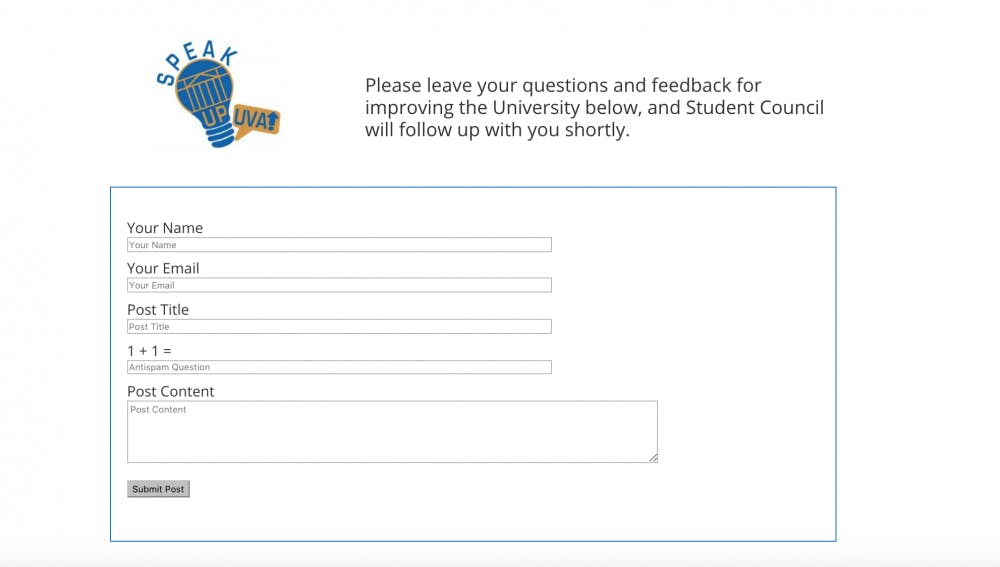With the relaunch of an old initiative, students now have a fast and easy way to voice their opinions to Student Council. The webpage, called “Speak Up U.Va.,” allows students to send comments and concerns directly to Student Council on issues they feel need to be addressed on Grounds.
The Speak Up U.Va website has existed for some time, but it was recently restructured and added to the homepage of the Student Council website.
Austin Gogal, a fourth-year College student and chair of Student Council’s Student Concerns Committee, works to address comments posted to the Speak Up U.Va. webpage. He said the new version of the website is making it easier for students to bring their concerns to the attention of Student Council and for the Council to reach out to those students directly.
“The Speak Up U.Va. website, I think because it wasn’t on the Student Council homepage, wasn’t getting quite as much traffic as we hoped,” Gogal said. “So having it on our homepage is really easy, because we can just tell students if they have a problem to look on the website so that they can contact any representatives or relevant committees or just post a comment through the link.”
Eddie Lin, a third-year College student and a Student Council College representative, was one of the people responsible for Speak Up U.Va.’s new interface.
“Speak Up U.Va. is an important part of Student Council because the primary purpose of Student Council is to solve student concerns, and a lot of times people don’t know the avenues they have to address Student Council about their concerns,” Lin said. “That’s why I pushed for a user interface change, so we can effectively follow up on student concerns.”
Speak Up U.Va. now requires students to include their University email addresses when they post their concerns, but that information stays anonymous and is only used for Student Council to follow up specific comments.
“Our priority at Student Council is always making things easier for students,” Gogal said. “I’m hopeful that with a good amount of outreach, this addition will be a great asset for people to be able to point to as a concrete example for how Student Council makes itself accessible and handles things effectively.”
Speak Up U.Va. allows students to comment on a variety of topics they have concerns about including academics, athletics, buildings and grounds, diversity engagement, safety and wellness and sustainability. One comment on the webpage suggests the University buses run later at night to make it easier for upperclassmen to get home, while another asks the dining halls to increase the amount of food available on Sundays.
Comments go to a representative staff that looks at the list and chooses which comments they will address on first-come, first-served basis.
While the goal is to address all student concerns that appear on the website, Student Council has set up an explicit set of rules for the content of students’ posts. They will not tolerate racial slurs, foul language, impersonation, advertising or uncited facts. Comments posted on the website have to be approved before they are made public.
“If someone submits a post, the technology administrator has to approve it first,” Lin said.
Currently, the website is primarily intended as an outlet for student input directly to Student Council. However, the comment feature of the website does allow for potential discussion among students, faculty and Council members.
Student Council plans to publicize the new Speak Up U.Va. interface, especially to first-year students who may need more resources since they’re new to the University, Lin said. He added that the platform isn’t useful unless students know about it and use it.
“If we have people know about it, if they know there’s a resource where they can go online, we’re able to more effectively address student concerns at this University,” Lin said. “And that’s the purpose of Student Council.”







